|
|
|
Sort Order |
|
|
|
Items / Page
|
|
|
|
|
|
|
| Srl | Item |
| 1 |
ID:
124130
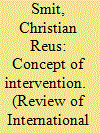

|
|
|
|
|
| Publication |
2013.
|
| Summary/Abstract |
Since the end of the Cold War, the number of books and articles on intervention in world politics has grown dramatically. Yet curiously little of this work subjects the concept of intervention itself to critical scrutiny. Scholars often preface their analyses with definitional discussions about what intervention is, but these definitions take a common form, conceiving intervention within a 'sovereignty frame'. This article questions this conception of intervention, arguing that it distorts our understanding of interventionary practices and forms of reasoning that occurred in non-sovereign international orders. After exploring the sovereignty framing of intervention in greater detail, I advance an alternative conception. International orders are systemic configurations of political authority: they comprise multiple units of such authority, each with its own realm of jurisdiction, organised according to some principle of differentiation. Importantly, this principle need not be territorial: it could be functional, for example. International intervention is the transgression of a unit's realm of jurisdiction, conducted by other units in the system. Unlike the sovereign framing of intervention, this conception is equally applicable to the interventionary ideas and practices of diverse international orders, and provides a better basis on which to understand how thinkers in different historical contexts have reasoned about intervention.
|
|
|
|
|
|
|
|
|
|
|
|
|
|
|
|
| 2 |
ID:
124175
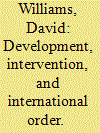

|
|
|
|
|
| Publication |
2013.
|
| Summary/Abstract |
The project of international development involves the reordering of states (or at least attempts to do so), it sits at the intersection between transnational forces and bounded political entities and it is a manifestation of the will to order of powerful states. It would seem then to be closely connected to practices of intervention. At times, the practices of development agencies have taken on a more interventionist character, but in recent years their relationship to many developing countries has taken on a more intricate, subtle, and everyday form. It has in important respects moved 'beyond' intervention. This has significance beyond international development. Development agencies have been recruited to wider projects of international ordering, especially the construction of regimes of global governance and the 'development' of post-intervention states.
|
|
|
|
|
|
|
|
|
|
|
|
|
|
|
|
| 3 |
ID:
124132
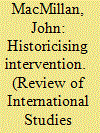

|
|
|
|
|
| Publication |
2013.
|
| Summary/Abstract |
This article identifies three key themes in British intervention for purposes of liberal reordering in the period 1815-50, namely the 'opening-up' of new market spaces (discussed in relation to Uruguay/the Argentine Confederation in the 1840s), a cosmopolitan humanitarianism evident in the campaign for the abolition of the Atlantic slave trade that ran throughout this period, and the political-ideological contest between constitutionalist and absolutist forces and represented here by intervention in the Iberian Peninsula in the late 1820s to1830s. In developing a strategic perspective upon military/naval intervention the analysis shows its utility to have been subordinate to more fundamental sociopolitical, cultural, and institutional determinants. With regard to understanding the outcomes of specific intervention the analysis shows the importance of systematically evaluating developments in the domestic political environments of both intervening and target state as well as the military campaign itself and the need for sufficient general alignment or synchronisation in the timeline of developments in each of these three domains. This model helps to explain that whilst liberal interventions are not necessarily bound to fail, they frequently prove more difficult, complex, and protracted than the interveners expect.
|
|
|
|
|
|
|
|
|
|
|
|
|
|
|
|
| 4 |
ID:
124131
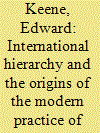

|
|
|
|
|
| Publication |
2013.
|
| Summary/Abstract |
This article argues that hierarchy plays an important role in shaping the practice of intervention, and that the changing nature of international hierarchy is a crucial part of the story of how the modern practice of intervention emerged. It describes the early modern order of precedence, and contends that it was ill-suited to encouraging people to recognise intervention as a distinctive kind of practice. However, over the course of the eighteenth century the structure of international hierarchy changed, with the emergence of a new kind of grading of powers, which provided the context for the development of a practice of intervention after 1815.
|
|
|
|
|
|
|
|
|
|
|
|
|
|
|
|
| 5 |
ID:
124134


|
|
|
|
|
| Publication |
2013.
|
| Summary/Abstract |
In this article I utilise the editors' conceptual frame of sovereignty/intervention/transnational social forces to argue that the relationship that ensues between these phenomena has to be understood in colonial-modern - rather than modern - terms. I thereby argue that intervention is a distinctive technology of colonial-modern rule, specifically, one that erects and polices the difference between sovereign and quasi-sovereign entities via a standard of civilisation. Additionally, I argue that transnational social forces struggle - cognitively, socially, and politically - over the upholding or refuting of this standard; and in this struggle, some might even defend particular sovereign entities against colonial interventions. I demonstrate my argument by explicating the global colonial context of the Italy/Ethiopia conflict in 1935-6, the nadir of the interwar crisis. I 'decolonise' received interpretations of the conflict through the heuristic of two differing catechisms of Psalms 68:31 proffered at the time: one, invoking a civilising mission of Africans; the other, invoking a project of self-liberation by Africans.
|
|
|
|
|
|
|
|
|
|
|
|
|
|
|
|
| 6 |
ID:
124170
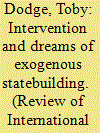

|
|
|
|
|
| Publication |
2013.
|
| Summary/Abstract |
The central thesis of this article is that when faced with state collapse, rising violence, and a complex stabilisation effort, the US, UN, and NATO in Afghanistan and the US and Britain in Iraq, deployed the dominant, if not only, international approach available, Liberal Peacebuilding. The article traces the rise of Liberal Peacebuilding across the 1990s. It argues that four units of analysis within neoliberal ideology, the individual, the market, the role of the state and democracy, played a key role within Liberal Peacebuilding, allowing it to identify problems and propose solutions to stabilise post-conflict societies. It was these four units of analysis that were taken from the Liberal Peacebuilding approach and applied in Afghanistan and Iraq. The application of a universal template to two very different countries led directly to the fierce but weak states that exist today.
|
|
|
|
|
|
|
|
|
|
|
|
|
|
|
|
| 7 |
ID:
124133
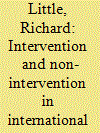

|
|
|
|
|
| Publication |
2013.
|
| Summary/Abstract |
This article aims to show that from the end of the eighteenth century, international order began to be defined in terms of ground rules relating to non-intervention and intervention, with the former being prioritised over the latter. After the Napoleonic wars, within continental Europe there was an attempt to consolidate an intervention ground rule in favour of dynastic legitimacy over the right of self-determination. By contrast, the British and Americans sought to ensure that this ground rule was not extended to the Americas where the ground rule of non-intervention was prioritised. During the nineteenth century, it was the Anglo-American position which came to prevail. Over the same period international order was increasingly bifurcated with the non-intervention ground rule prevailing in the metropolitan core and with the intervention ground rules prevailing in the periphery. This article, however, only focuses on the metropolitan core and draws on two case studies to examine the non-intervention ground rule in very different circumstances. The first examines the British response to the American Civil War in the 1860s during an era of stability in the international order. The second explores the British Response to the Spanish Civil War in the 1930s when the international order was very unstable and giving way to a very different international order.
|
|
|
|
|
|
|
|
|
|
|
|
|
|
|
|
| 8 |
ID:
124129
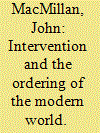

|
|
|
|
|
| Publication |
2013.
|
| Summary/Abstract |
This introductory discussion establishes the notion of intervention as a 'social practice' and carves out the contextual and conceptual space for the Special Issue as a whole. The first move is to recontextualise intervention in terms of 'modernity' as distinct from the sovereign states system. This shift enables a better appreciation of the dynamic and evolutionary context that generates variation in the practice of intervention over time and space and which is analytically sensitive to the economic and cultural (as well as Great Power) hierarchies that generate rationales for intervention. The second move is to reconceptualise intervention as a specific modality of coercion relatively well-suited to the regulation or mediation of conflict between territorially bounded political communities and transnational social forces. Third is to 'historicise' the practice of intervention through showing how it has changed in relation to a range of international orders that have defined the modern world and which are each characterised by a different notion of the relationship between social and territorial space. Fourth and finally is a brief consideration of the possibility of intervention's demise as a social practice.
|
|
|
|
|
|
|
|
|
|
|
|
|
|
|
|
| 9 |
ID:
124157
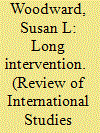

|
|
|
|
|
| Publication |
2013.
|
| Summary/Abstract |
Great Power intervention in the Balkans since the late nineteenth century shows a striking continuity in motivations, methods, and consequences. The article proposes that current intervention practices are largely a response to the Balkan theatre in the 1990s and thus institutionalise this continuity more than arguments about normative and institutional change since 1990 suggest. Three continuities are emphasised: the concept of a 'turbulent frontier' to explain an unintended dynamic of nearly continuous intervention, the importance of local actors' interests (the pull of intervention) alongside those of major power interests (the push), and the primary influence on domestic orders and cause of the 'turbulence' of economic relations.
|
|
|
|
|
|
|
|
|
|
|
|
|
|
|
|
| 10 |
ID:
124176
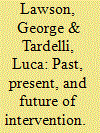

|
|
|
|
|
| Publication |
2013.
|
| Summary/Abstract |
Despite the prominent place of intervention in contemporary world politics, debate is limited by two weaknesses: first, an excessive presentism; and second, a focus on normative questions to the detriment of analysis of the longer-term sociological dynamics that fuel interventionary pressures. In keeping with the focus of the Special Issue on the ways in which intervention is embedded within modernity, this article examines the emergence of intervention during the nineteenth and twentieth centuries, assesses its place in the contemporary world, and considers its prospects in upcoming years. The main point of the article is simple - although intervention changes in character across time and place, it is a persistent feature of modern international relations. As such, intervention is here to stay.
|
|
|
|
|
|
|
|
|
|
|
|
|
|
|
|
| 11 |
ID:
124136
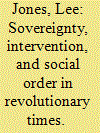

|
|
|
|
|
| Publication |
2013.
|
| Summary/Abstract |
This article explores how sovereignty and (non-)intervention are implicated in the (re)production of specific social orders. Sovereignty and the non-interference principle circumscribe 'domestic' politics from 'the international', defining who is legitimately included or excluded from the struggles that determine political and social orders. State managers seek to admit forces and resources favourable to the order they are seeking to create, whilst excluding those deleterious to it. In revolutionary periods, however, these attempts to 'cage' social relations often crumble as transnational forces engage in fierce, multifaceted conflicts overlapping territorial borders. In such circumstances, both norms of non-interference and practices of intervention may be used by dominant forces to help contain the spread of sociopolitical conflict and to strengthen their hand in the struggle to (re)define social order. Sovereignty regimes are thus shaped by the strategies and ideologies of the various social groups locked in conflict at a particular historical moment. This argument is illustrated through the case of Cold War Southeast Asia, where sovereignty and intervention were both used to stabilise capitalist social order and curtail transnational, radical threats from below.
|
|
|
|
|
|
|
|
|
|
|
|
|
|
|
|
|
|
|
|
|